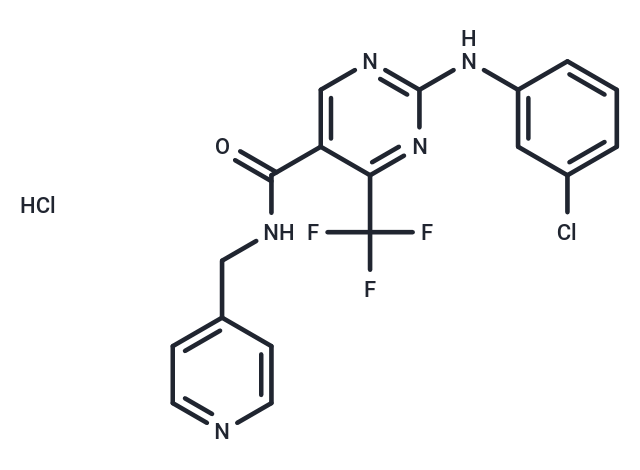
GW 833972A
CAS No. 1092502-33-4
GW 833972A( —— )
Catalog No. M35825 CAS No. 1092502-33-4
GW 833972A is a selective CB2 receptor agonist that inhibits induced neural depolarization and citric acid-induced cough in an animal model.
Purity : >98% (HPLC)
 COA
COA
 Datasheet
Datasheet
 HNMR
HNMR
 HPLC
HPLC
 MSDS
MSDS
 Handing Instructions
Handing Instructions
| Size | Price / USD | Stock | Quantity |
| 2MG | 532 | Get Quote |


|
| 5MG | 787 | Get Quote |


|
| 10MG | 1074 | Get Quote |


|
| 25MG | 1463 | Get Quote |


|
| 50MG | 1822 | Get Quote |


|
| 100MG | 2250 | Get Quote |


|
| 500MG | 4410 | Get Quote |


|
| 1G | Get Quote | Get Quote |


|
Biological Information
-
Product NameGW 833972A
-
NoteResearch use only, not for human use.
-
Brief DescriptionGW 833972A is a selective CB2 receptor agonist that inhibits induced neural depolarization and citric acid-induced cough in an animal model.
-
DescriptionGW 833972A is a selective CB2 receptor agonist. GW 833972A inhibits induced nerve depolarization and citric acid-induced cough in animal models.
-
In Vitro——
-
In Vivo——
-
Synonyms——
-
PathwayGPCR/G Protein
-
TargetCannabinoid Receptor
-
RecptorCannabinoid Receptor
-
Research Area——
-
Indication——
Chemical Information
-
CAS Number1092502-33-4
-
Formula Weight444.24
-
Molecular FormulaC18H14Cl2F3N5O
-
Purity>98% (HPLC)
-
Solubility——
-
SMILESCl.O=C(NCC=1C=CN=CC1)C2=CN=C(N=C2C(F)(F)F)NC=3C=CC=C(Cl)C3
-
Chemical Name——
Shipping & Storage Information
-
Storage(-20℃)
-
ShippingWith Ice Pack
-
Stability≥ 2 years
Reference
1. Belvisi MG, et al. Inhibitory activity of the novel CB2 receptor agonist, GW833972A, on guinea-pig and human sensory nerve function in the airways. Br J Pharmacol. 2008 Oct;155(4):547-57.?
molnova catalog



related products
-
GP 1a
GP 1a is a potent agonist of cannabinoid receptor 2 (CB2) (EC50=7.1), as shown in cAMP, GTPγS and β-arrestin recruitment assays.
-
Pregnenolone acetate
Pregnenolone acetate is a powerful neurosteroid, the main precursor of various steroid hormones including steroid ketones.?
-
Pravadoline
Pravadoline is a cannabinoid receptor agonist. Pravadoline inhibited the PGs synthesis in mouse brain and displayed antinociceptive activity in rodents subjected to a variety of thermal, chemical, and mechanical nociceptive stimuli.



 Cart
Cart
 sales@molnova.com
sales@molnova.com


